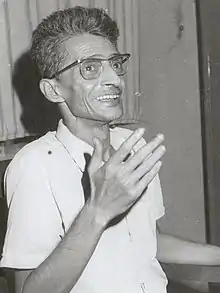Charu Majumdar
Charu Majumdar (May 15, 1919 – July 28, 1972), was a Naxalite Militant from India. Born in a progressive landlord family in Siliguri in 1918, he formed the militant Naxalite cause. He also authored the historic accounts of the 1967 Naxalbari uprising and his writings have become the ideology which guides the Naxal movement.[1]
Charu Majumdar | |
|---|---|
 | |
| Born | 15 May 1919 |
| Died | 28 July 1972 (aged 53) |
| Nationality | Indian |
| Alma mater | University of North Bengal Siliguri College |
| Office | General Secretary of CPI(ML) |
| Term | 1969–1972 |
| Political party | Communist Party of India (Marxist-Leninist) Communist Party of India (Marxist) Communist Party of India |
| Spouse(s) | Lila Mazumdar Sengupta |
Biography
Majumdar was born in 1919 in Siliguri in Zamindar family.[2][3] His father was a freedom fighter during the Indian independence movement. Majumdar dropped out of college in 1938.
After dropping out of college in 1937–38, Majumdar joined the then banned Communist Party of India (CPI) to work in its peasant front. Soon an arrest-warrant forced him to go underground for the first time as a leftist activist. Although the CPI was banned at the outbreak of World War II, he continued CPI activities among peasants and was made a member of the CPI Jalpaiguri district committee in 1942. The promotion emboldened him to organise a 'seizure of crops' campaign in Jalpaiguri during the Great Famine of 1943, more or less successfully. In 1946, he joined the Tebhaga movement in Jalpaiguri region and embarked on a proletariat militant struggle in North Bengal. The stir shaped his vision of a revolutionary struggle. Later he worked among tea garden workers in Darjeeling.
The CPI was banned in 1948 and he spent the next three years in jail. In January 1952 he married Lila Mazumdar Sengupta, a fellow CPI member from Jalpaiguri. The couple moved to Siliguri, which was the centre of Majumdar's activities for a few years. His ailing father and unmarried sister lived there in abject poverty. He was briefly imprisoned in 1962.
During the mid 1960s Majumdar organized a leftist faction in Communist Party of India (Marxist) (CPI(M)) in northern Bengal. In 1967, a militant peasant uprising took place in Naxalbari, led by his comrade-in-arms Kanu Sanyal. This group would later become known as the Naxalites, and eight articles written by him at this time—known as the Historic Eight Documents—have been seen as providing their ideological foundation: arguing that revolution must take the path of armed struggle on the pattern of the Chinese revolution. The same year, Majumdar broke away and formed the All India Coordination Committee of Communist Revolutionaries which in 1969 founded the Communist Party of India (Marxist–Leninist)—with Majumdar as its General Secretary. He was captured from his hide-out on 16 July 1972. He died of a massive heart attack at 4 am on 28 July 1972 – aged 53 – in the same lock-up, the CPI (ML) records say. Reports also say that he was tortured to death.[4]
"Even the dead body was not given to his family. Police, accompanied with immediate family members carried the body to crematorium. The whole area was cordoned off and no other relatives were allowed in as his body was consigned to flames..."[5]
The radical leftist movement in India has seen many ideological splits since Majumdar's death.[6]
References
- "Charu Majumdar – The Father of Naxalism". Hindustan Times. Archived from the original on 4 November 2012.
- "नक्सल आंदोलन इन्होंने शुरू किया, आज उनके नाम पर आतंकवादी घूमते हैं". thelallantop.
- "Naxalbari@50: Maoist uprising was sparked by this tribal woman leader". hindustantimes. 23 May 2017.
- "Charu's children to write mother's memoirs". Times of India.
- "The last of the three". The Indian Express.
- Kujur, Rajat (2009). "Naxal conflict in 2008: an assessment" (PDF). Institute for Peace and Conflict Studies.